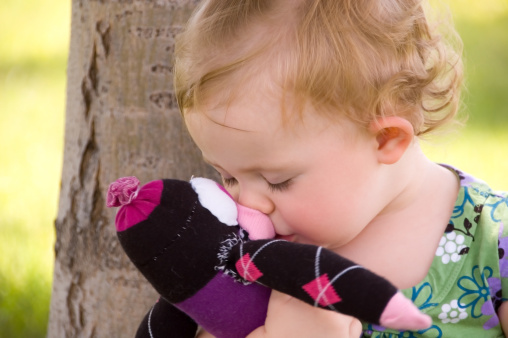This originally appeared on The Daily Life. Republished here with permission.
Instead of being praised for her friendliness, people have started commenting on my daughter’s flirtatiousness. Not even 2 years old and she’s already being slut-shamed.
My baby daughter likes to kiss. A lot. She kisses her friends as she greets them at the playground (when we speak about one, in particular, at home, she repeats his name and punctuates it with a kiss, such is her affection for him). She kisses her toy rabbit goodnight. She kisses her books and the water in the bathtub and our car and strangers and our puppies. She loves to kiss.
It’s something my husband and I have encouraged in her. At first we encouraged it because it was a nice thing to do (and seriously, to receive a kiss from your baby is just about the most life-affirming moment there is). “Kiss Daddy goodbye,” I’d say as we said goodbye to my husband when he left for work. “Blow Grandma a kiss,” when I spoke to my mom on the phone.
Then, as she grew older and started to get a little more, ahem, active, kissing was a way to show her how to behave around others—it was the opposite of say, poking someone in the eye (one of her favorite pastimes) or pulling their hair (second only to a poke in the eye in her book). “No, no, we don’t hit our friends,” we explain to her. “We give them a kiss.” To a 15-month-old who can probably understand only a little more than we give her credit for, this seems like a reasonable way to discipline.
You can imagine my surprise then when, instead of being praised for her friendliness, people started commenting on my daughter’s flirtatiousness. Not even 2 and she’s already being slut-shamed. Bloody hell: What hope does she have?
At a family barbecue recently, we all had a laugh as she repeatedly kissed another baby, who was not enjoying the experience at all. My daughter appeared not to notice that her affection was going unrequited, and continued kissing the poor kid, who looked desperately to his own mother for help.
“Watch out, Dad!” said a family friend. “If she’s like this now, imagine what she’s going to be like at 16!”
The inference was that, by 16, she’d be Miley Cyrus, kissing (or, as the case may be, licking) everything that moved and some stuff that didn’t and generally giving it away to anyone who asked.
I know that it was said in jest. I know that, if challenged, this family friend would be aghast at the suggestion that she’d shamed my little girl for something so innocuous—it would never have been her intention. But I also know that this is just the beginning of a lifetime of ways in which she will be policed for being a girl. I expected to have to deal with this stuff at some stage—but I’m shocked and disappointed that it has begun so early.
I’ve seen little boys kiss kids in the playground. They’re congratulated for being caring and cute. But when a little girl does the same thing, to some people, it’s seen as a gateway to promiscuity? Other people have actually said, “Oh, she’s a little flirt, isn’t she?” Ugh. How can we win when sexism like this starts so early?
The trouble with situations like this is that the sexism is so subtle as to almost go unnoticed and therefore, can easily be dismissed or forgotten. We’ve all been told that we’re “overreacting” in an instance like this—does it really matter that someone complimented your daughter on her dress and your son on his running ability? Does it really matter that girls are called “bossy” and “feisty” and boys are labeled “leaders”?
Yes, actually, it does.
I think that the casual ways sexism defines our lives can be far more influential and insidious than unequal policy. Policy is in many ways far easier to change than people’s minds—just ask the women who have been “mommy-tracked” at work despite legislation that is meant to protect them from discrimination. Just because the person may not have meant anything hostile by what they said doesn’t mean the sexism isn’t there, or that we shouldn’t care about it, or do something to change it. I don’t want my daughter growing up thinking that she should be ashamed of who she is in any way, but especially for doing something as caring as kissing her friends.
So the next time someone says something about my 2-year-old’s penchant for giving kisses, I’m going to call on the wisdom of the great Leslie Knope, who, upon learning she accidentally married two gay penguins, defended herself thusly: “[I did it] because I firmly believed it would be cute. And it was!”
Lauren is a writer for the Daily Life. Follow her on Twitter.
Related Links:

